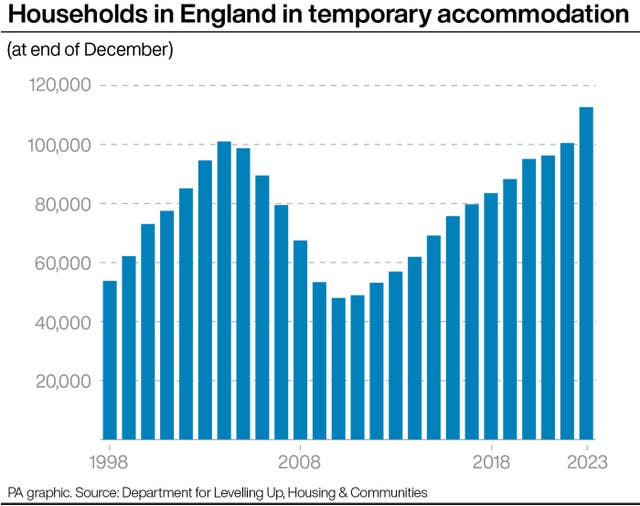Generation of children having lives blighted by homelessness, warns charity
There were 145,800 children in temporary accommodation as of the end of December last year.

The number of children living in temporary accommodation has reached another record high, while people needing help for homelessness due to no-fault evictions has also reached a new peak.
A major housing charity warned that a generation of young people are having their lives “blighted by homelessness”, while campaigners have repeated calls for long-promised rental reforms going through parliament to be strengthened in the face of a “spiralling crisis”.
There were 145,800 children in temporary accommodation as of the end of December last year, up by a fifth on 20 years ago when records for this measure began.
The figure is up 15% from 126,340 on the same period in 2022, the figures published by the Department for Levelling Up, Housing and Communities (DLUHC) showed.

The number of overall households in temporary accommodation rose by 12% from 100,510 at the same time in 2022, while the number of households with children increased by 15% from 61,980.
The total number of children living in temporary accommodation was 145,800 as of December 31, a rise of 15% from 126,340 on the same period in 2022.
A total of 317,430 households were assessed as being owed a prevention or relief duty in 2023, a rise of almost 9% on the previous year.
Last year, 25,910 people were assessed as needing help for homelessness due to having had a section 21 notice served on them – otherwise known as a no-fault eviction.
This is the highest number in the six years for which statistics are published on this measure in the data tables, and has led campaigners who have long pushed for a ban on such evictions to describe the Government’s approach as “maddening”.
Tom Darling, campaign manager at the Renters’ Reform Coalition, said: “Observing this steadily spiralling crisis, it is maddening to watch the Government’s approach to the Renters (Reform) Bill, one of the key levers at its disposal to tackle this crisis.
“Neglected, dropped, picked back up again, delayed, deprioritised, and – finally – gutted of key provisions by a group of pro-landlord MPs.”
He said the Bill in its current form “will fail to touch the sides of this crisis” and argued it “needs major surgery in the Lords” to tackle the problem.
Polly Neate, chief executive of Shelter, said: “The Government cannot stand idly by while a generation of children have their lives blighted by homelessness.”
She said “decades of failure to build enough genuinely affordable social homes has left families struggling to cobble together extortionate sums every month to keep a roof over their heads”.
Political parties must commit to “ending the housing emergency”, she added, urging them all to pledge to build 90,000 social homes a year for 10 years, as well as to “overhaul of the Renters (Reform) Bill so that it delivers genuine safety and security for private renters”.
A chief executive at a housing provider described a “growing humanitarian crisis unfolding behind closed doors in towns and cities across England”.
John Glenton, executive director of care and support at Riverside – which describes itself as the largest provider of accommodation for people affected by homelessness in England, said: “It is important to be honest about the situation.
“In the 35 years of working in the sector I’ve never known things to be so bad.”
Separate statistics, also published on Tuesday, showed rough sleeping in London has risen by a third year-on-year.
There were 4,118 people seen sleeping rough in the capital in the first three months of this year, up from 3,107 in the same period in 2023 – although the latest figure was down 6% from the previous quarter.
The number of new rough sleepers was 2,038 from January to March this year, a rise of 37% from 1,490 in the same three months last year, according to the latest Combined Homelessness and Information Network (Chain) statistics.
Mayor of London Sadiq Khan has made it a manifesto pledge to end rough sleeping in the capital by 2030, promising to “condemn the scandal of rough sleeping to history”, should he be re-elected when voters cast their ballots on Thursday.
Rick Henderson, chief executive of the organisation, which manages the Chain database, said: “Across the country, a lack of social housing and an insecure private rental system combine together to pressure people into homelessness.”
He reiterated disappointment at what campaigners and homelessness charities have described as a “watered down” Renters Reform Bill “in favour of landlord interests”
He added: “It (the Government) continues to do very little to address the other long-term causes of homelessness.
“It needs to change its approach, favouring the wellbeing of those experiencing homelessness, to see any progress on these statistics in the future.”
A DLUHC spokesperson said councils are being supported with £1.2 billion to give help to those who need it and that local housing allowance has been boosted to help towards rental costs.
They added: “Temporary accommodation is a vital safety net to make sure families are not left without a roof over their heads, but councils must make sure it is suitable for families who have a right to appeal if it’s not.”





